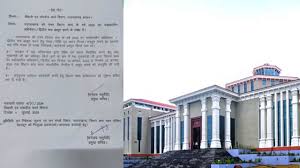What is the compelling reason behind the environmental clearance of GM Mustard, Supreme Court asked the Center


Amid concerns over environmental pollution caused by genetically modified (GM) crops, the Supreme Court on Thursday asked the central government whether there was any compelling reason behind giving environment clearance to GM mustard that failing to do so would doom the country.
The apex court said that Indian farmers, unlike their western counterparts, are not literate and do not understand about genes and mutations despite events like ‘Krishi Mela’ and ‘Krishi Darshan’ and this is a ground reality.
The Center told the apex court that the opposition to GM crops by activists, experts and scientists is “ideological” rather than based on scientific reasoning. It is noteworthy that on October 25, the Genetic Engineering Appraisal Committee (GEAC), constituted under the Ministry of Environment, had given environmental approval to the transgenic mustard hybrid variety DMH-11.
A bench of Justice Dinesh Maheshwari and Justice BV Nagaratna, appearing for the Centre, heard Attorney General (AG) R.K. Venkataramani that the question that needs to be answered is whether the environmental clearance of GM mustard will have any irreversible consequences.
Justice Nagaratna said, ‘We are not talking about ideology here. As far as literacy and awareness about genes and mutations is concerned, our farmers are not like the farmers of western countries. No matter how many ‘Krishi Melas’ and ‘Krishi Darshan’ (a program on agriculture telecast on DD Kisan channel) we have. This is the ground reality. We have to look at everything holistically.
Venkataramani said the question was not one of compulsion but one of process and the government had followed all regulatory procedures as per the format recommended by the court-appointed Technical Experts Committee (TEC).
According to Business Standard, the bench said that it is not saying that the government has any problem but it is examining the report of TEC, which in its report has said that GM crops are not suitable for Indian conditions. The bench said, “Experts have given their reasons, which according to you (government) are ideological. Of course, what they say is not final and not binding on the government. This is just his opinion. The government needs to tell us what is its view on the opinion expressed by the experts.
The AG argued that the TEC has made recommendations to the government that steps need to be taken for risk management and creating a regulatory framework. On the other hand, he gave a report that GM crops are not suited to Indian conditions, which was not among the terms of reference given to the panel by this Court.
Venkataramani said, “The government has done from time to time what the court has asked the committee to do as per the terms of reference, which is to create a regulatory framework. The decision of 25 October is part of a process lasting more than a decade.
Advocate Prashant Bhushan, appearing for activist Aruna Rodrigues, who has campaigned against GM crops, argued before the bench on Wednesday that GM mustard seeds have started germinating after being cleared for environmental testing and before flowering. Only its plants should be uprooted so that the environment can be prevented from getting contaminated.
It is to be known that the Genetic Engineering Appraisal Committee (GEAC), under the Union Environment Ministry, had recommended the release of genetically modified mustard seeds for environmental testing, which experts believe would be beneficial for its commercial cultivation. will pave the way.
Significantly, the government has so far (in the year 2002) approved only one GM crop – Bt cotton – for commercial cultivation. Earlier, the top court had ordered status quo on the GEAC’s decision to approve GM mustard for commercial cultivation. The court had asked Additional Solicitor General Aishwarya Bhati to ensure that “no prompt action is taken” till the hearing of an application filed before it in this regard.
The move came amid opposition from green groups, who say commercial cultivation of GM mustard could adversely affect human health and food security. The Swadeshi Jagran Manch (SJM), affiliated to the Rashtriya Swayamsevak Sangh, and the Bharatiya Kisan Sangh (BKS), the farmers’ wing of the organisation, have also opposed the recommendation to give environmental clearance to GM mustard.
According to the minutes of the October 18 meeting of the biotechnology regulator GEAC, it has ‘approved mustard hybrid variety DMH-11 for seed production and testing as per Indian Council of Agricultural Research (ICAR) guidelines and other extant rules and regulations before commercial approval’. Environmental clearance recommended.
The transgenic mustard hybrid variety DMH-11 has been developed by the Center for Genetic Manipulation of Crop Plants (CGMCP) at Delhi University.






